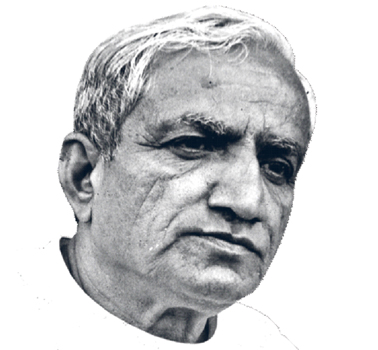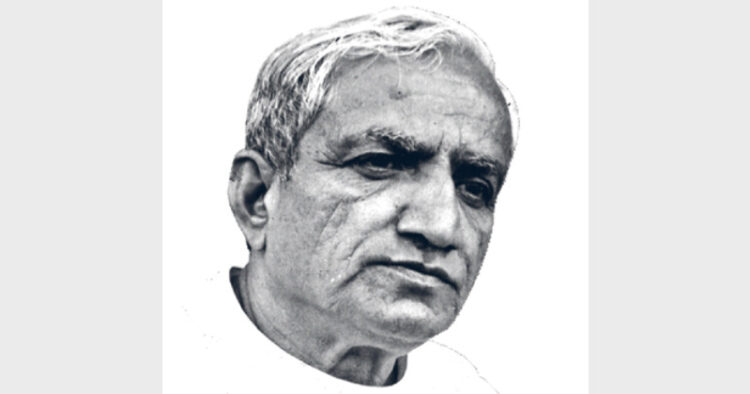
Thengadiji was a drista, a seer. Decades ago, he saw and theorised the collapse of communism as, he perceived, it went against human nature. And it has happened
S. Gurumurthy
He built the largest trade union in India, the Bharatiya Mazdoor Sangh. Formed in 1955 it over took INTUC, the largest trade union, in just three decades. In 1989, strength of BMS was 31 lakh plus. That was more than the combined strength of CITU and AITUC, the monopolists of trade union movement. Today its membership is over 83 lakh, more than the collective of most other trade unions. Yes, he built the most powerful trade union. Yet, he was not a communist. He actually opposed the communists, stormed their citadel and captured it. Never a Socialist, but he defeated them in their own territory. He waged an open war, an ideological war, against them, and defeated them in a straight war, not in guerrilla warfare. Also he never used his strength, never called for a bandh, the normal weapon of large trade unions, and never brought any city to stand still. His unions never indulged in violence. He never made his unions the wing of any political party.
Though a trade union leader, he was not an urbanite like most trade unionists. He also built the largest union of agriculturists in India, the Bharatiya Kisan Sangh. Still he was not a village versus town man, or agriculture versus industry man. For him nationalism was the melting pot of all sectional views and interests. He never believed in the distinction between classes, between the rich and the poor, but, actually stood for collective national interests. Thus he carried nationalism to territories monopolised by class hatred and class war and rendered class idea almost irrelevant. When globalisation challenged India in the early nineties and every one helplessly just opposed it or blindly welcomed it, he recalled the spirit of the freedom movement, the Swadeshi idea. He formed the Swadeshi Jagran Manch (SJM) which articulated an alternative indigenous economic model, not just opposition to globalisation. It emerged as the bulwark against mindless globalisation and succeeded in creating a vision for India as a global power. His creations, the BMS, the Kisan Sangh, and the SJM, are known and powerful in thought and action, but he, the creator himself, is not known.
Who is he? Dattopant Thengadi, unknown to most, founded institutions known and powerful but himself not known. He passed away in 2004 at the age of 84, with energies that one would see in a man of 48. He was of course a resounding success as a trade unionist. But this does not exhaust him. He was more. He was an astounding intellectual with remarkable grasp of history and economics, sociology and politics. Yet he rarely appeared in public or even rarely allowed himself to be photographed or interviewed by mass media. In his view nation builders do better things than stand before cameras. Yet he was in politics, in the Rajya Sabha for two terms. But that did not make any difference to his definition of himself. He was an activist, who did what was doable in ten lives in one. Yet massive activity did not interfere with his contemplative genius. He found time amid chaotic activity to think, read and write. He authored innumerable books of originality and high intellectual content — some 50 books in all, 27 in Hindi, 12 in English and 10 in Marathi. He has presented innumerable papers on profound subjects in national and international conferences. He learnt five languages apart from Marathi and English. He founded, inspired, managed and advised over a hundred organisations! And found time for all activities, yet time to talk and chit chat with thousands of ordinary workers! He could discover the 25th hour in the day and the thirteenth month in the year.
What inspired him to such unbelievable mental, physical and intellectual activity beyond all known reserves of human energy? What drove him to attempt and accomplish the un-attempted impossible? The RSS, the much-misunderstood and much maligned open air university that trains patriots of high commitment in this country even today. He became a full time Pracharak of the RSS at the age of 22 and continued to work full time untill he breathed his last. No office attracted him. He could have occupied any position in public life. But for people like him positions meant nothing.
He was a drista, a seer. Decades ago, he saw and theorised the collapse of communism as, he perceived, it went against human nature. It has happened. He has also theorised that capitalism too will collapse as that too is against human spirit and nature. This is waiting to happen. Even in philosophising the resistance to globalisation he foresaw national spirit as the greatest defence against global forces. He unveiled the hidden element of globalisation as the competition between nations. Result, not just in India but, all over the world today the real resistance to globalisation comes from perceived national interest, that is, Swadeshi at individual national level.
Thengadi was under study of Babasaheb Ambedkar. ‘Gurumurthy, I do not agree with what Arun Shourie’s conclusions on Babasaheb Ambedkar’, he once told me. I pointed out to him that Arun’s book was fully documented. He asked me, ‘do you mean to say that the lives of people who had had to face the greatest of challenges can be captured in records and documents?’ He added that the complex times and the challenges that ‘Baba’ – this is how he called Babasaheb Ambedkar – faced could not be read from records. ‘In fact most of the recordings cosmetise the real facts, more bluntly, they conceal, not bring out, the truth. So records cannot present the challenging life of Babasaheb Ambedkar’. Thengadi could talk with authority about Babasaheb Ambedkar because he was full time with Ambedkar in the last four years of Babasaheb’s life.
What Thengadi told me further was stunning. He said ‘I was eye witness to Babasaheb’s tensions and problems’. He recalled ‘Babasaheb wanted the Hindu saints and religious heads to declare openly that untouchability did not have the sanction of Hindu religious scripts’. RSS efforts in this direction were not bearing fruit. But Babasaheb told Thengadi that time was running out. His health was deteriorating fast in 1954. Baba Saheb told Thengadi, ‘I have faith in the process of the RSS in removing untouchability. But that is too slow. I cannot wait because I will not live to see the end of the problem’. Thengadiji also recalled what made Babasaheb embrace Buddhism, in Babasaheb’s own words thus: ‘if I did not show the way for this helpless community they would be hunted down by Christian church and the communists”. What Babasaheb wanted the Hindu religious leaders to do in 1954, RSS could persuade them to do only a decade later, in 1965, in a conference of Hindu religious leaders in Udupi organised by the Vishwa Hindu Parishad. This made many, me included, insist that Thengadi wrote on his days with Babasaheb. A couple of months before Thengadi died he did this too, and his book on Babasaheb Ambedkar was also released.
He owned nothing, not a house or a car, no cell phone nothing else. He lived in a small room in Delhi provided by the BMS and in other’s houses elsewhere. His needs a few kurtas and dhotis, were accommodated in a suit case. He travelled in overnight buses and mostly second class in trains. Never thought of marriage as his time was exhausted by the cause he had taken up in life. A rishi, a tapasvi, he was. Like most tapasvis, he is also little known. National newspapers which waste thousands of tons of newsprint on what retired or topless cine stars do in the morning and evening never even reported on this great man’s work, much less on his greatness. Having seen him closely and known him intimately and learnt from him immensely, the only thing I could do is to let a few others know that a tapasvi died on October 14, 2004 unnoticed by the media.
(The writer is renowned Swadeshi thinker. Abridged version of the article originally published on www.gurumurthy.net)














Comments